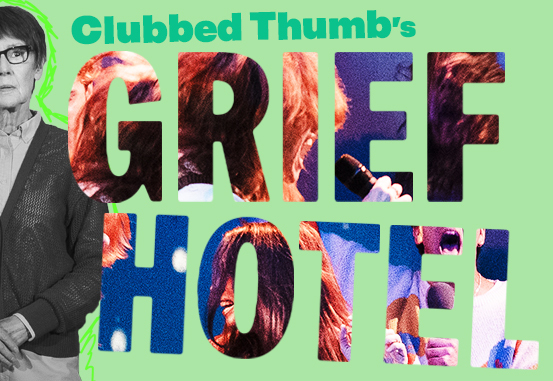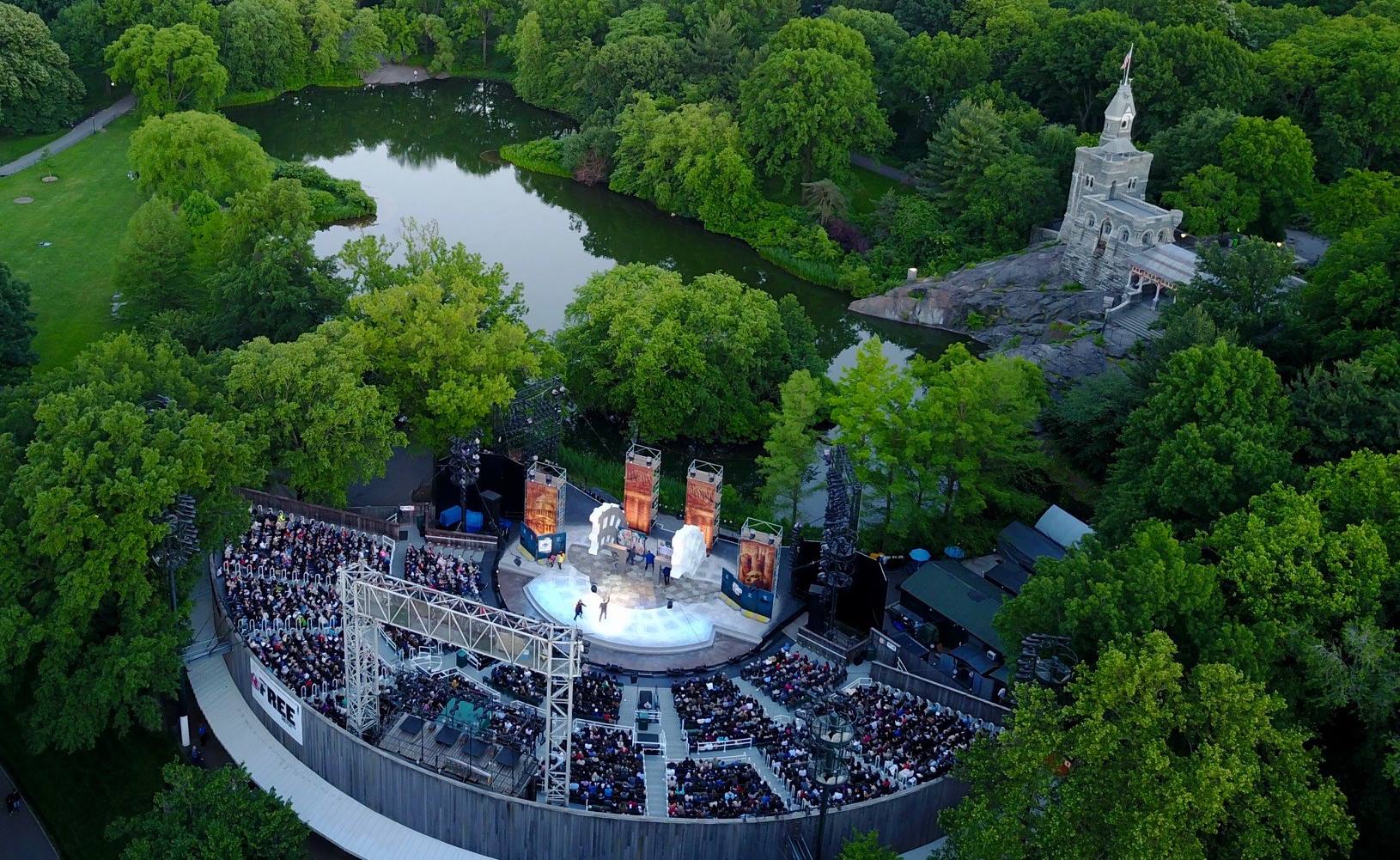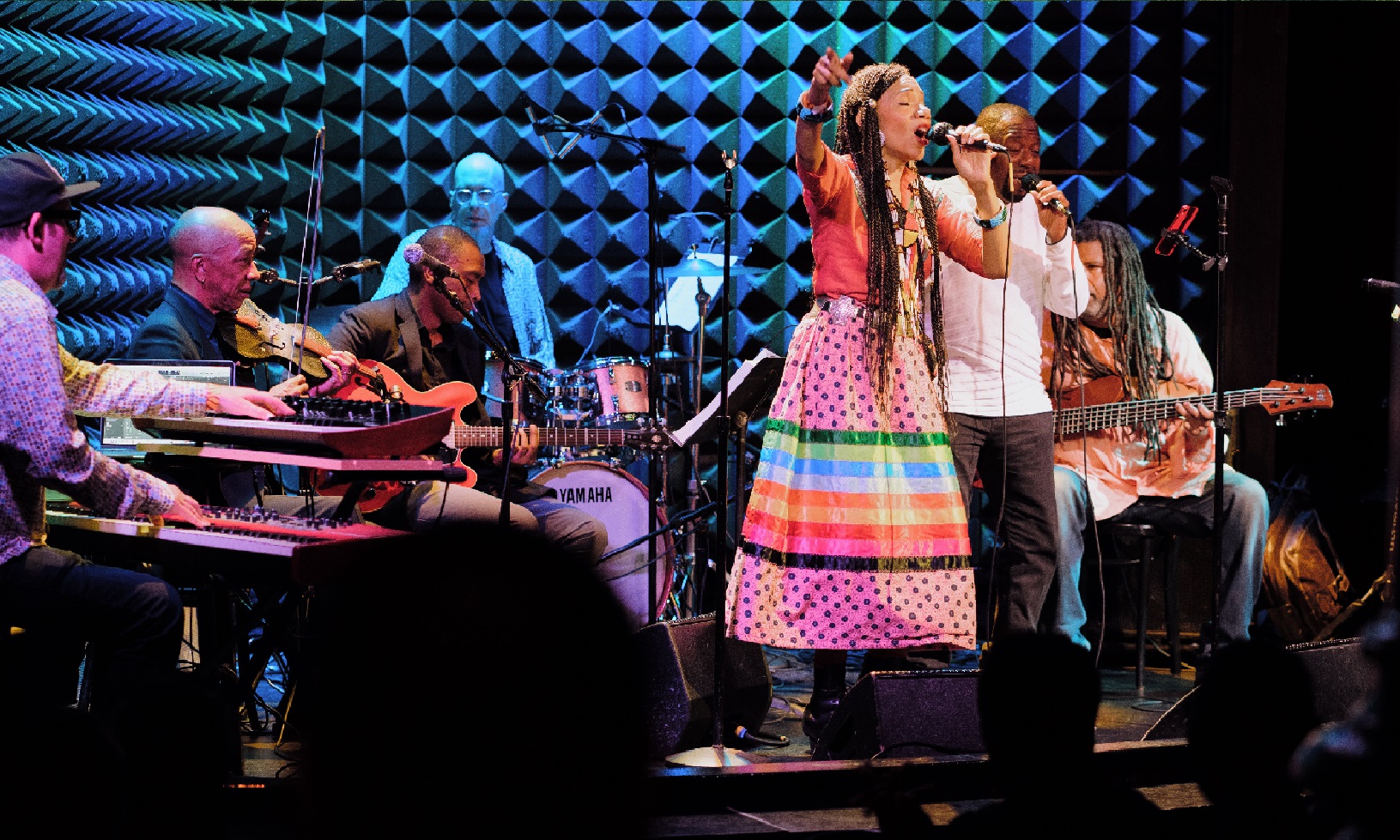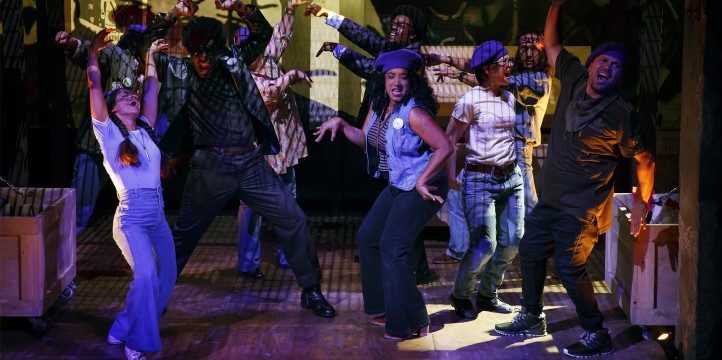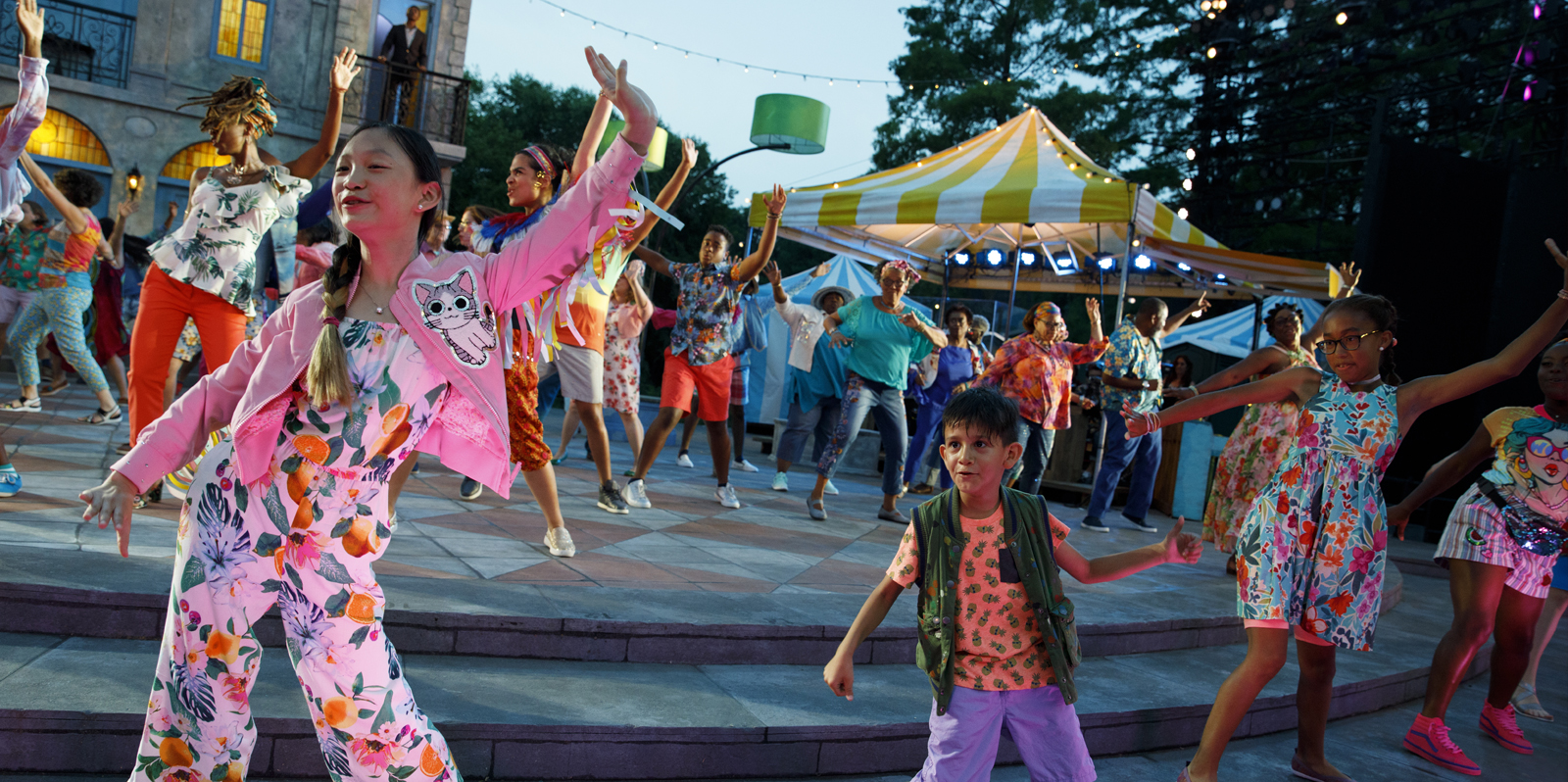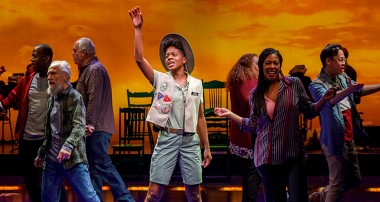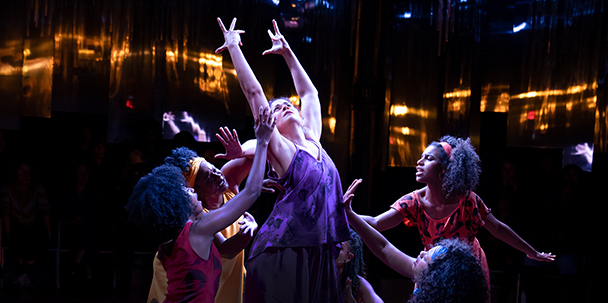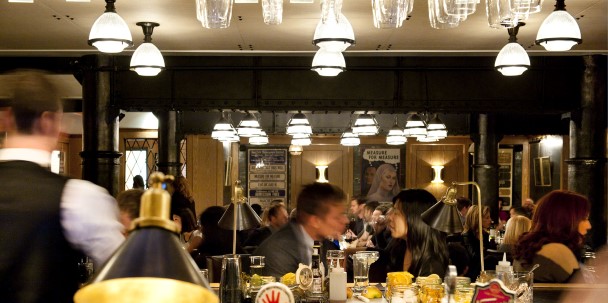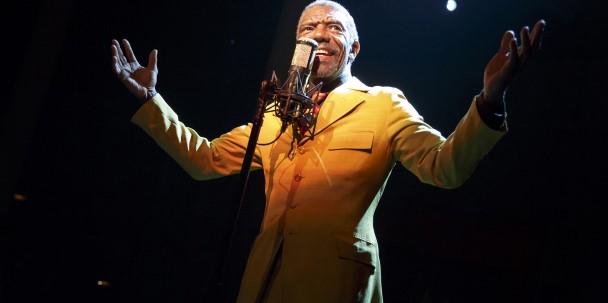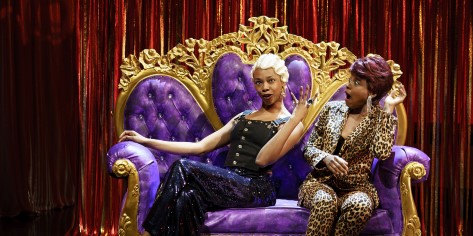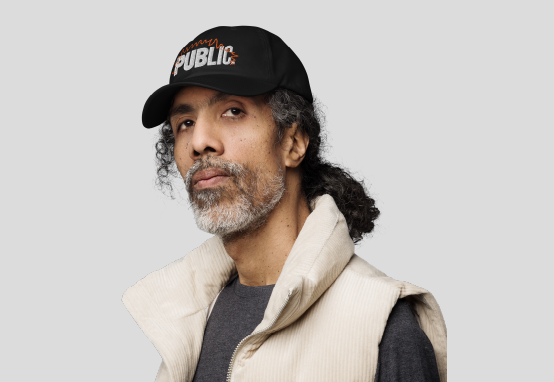Reynaldi Lindner Lolong: In 1954, Joe Papp had a brilliant idea to bring free productions of Shakespeare to the people of New York. He started on the Lower East Side, toured parks across the city, and ended up in Central Park and on Aster Place.
Drew Broussard: But that was just the beginning. What began as summertime Shakespeare in neighborhood parks has since blossomed into a year-round hub of culture, with new plays and musicals—
RLL: experimental work—
DB: live music—
RLL: international performance art—
DB: cabaret—
RLL: conversations and civic dialogue—
DB: community engagement—
RLL: and of course, Shakespeare.
DB: Through it all, the impulse has remained the same: that culture belongs to everyone, and that theatre should be of, by, and for all people. Welcome to Public Square, a podcast from The Public Theater.
DB: Hello, and welcome to Public Square! I’m Drew Broussard, from the artistic staff.
RLL: I’m Reynaldi Lindner Lolong, from the marketing and communications team. Now, as many people know, June is Pride Month and this year’s Pride is bigger than usual with World Pride being held here in New York, and of course we have the fiftieth anniversary of Stonewall. So to honor all of those things, we’ve got some pretty fun stuff planned here at the Public.
DB: Yeah, our big annual free Public Forum event in the park at The Delacorte Theater—this year it’s happening on Monday, June 17th, if you’re going to be in town—we’re calling it Queer and Now, and it’s a couple of things: it’s a celebration of World Pride, it’s a commemoration of Stonewall 50, it’s looking at The Public’s long history of artistic engagement with the LGBTQ community, and imagining what a beautifully queer future might look like.
RLL: The whole idea of Queer and Now has really encouraged us to look at queer culture and what being a queer theatre-maker means from an intergenerational angle, how we both honor the past and also look forward, and that pairing is really what inspired the conversation we’re going to share with you today. We’ll be talking to Heidi Griffiths, who has worked in our casting department for more than twenty years, and Ryan Haddad, a playwright in our Emerging Writers group. We’ll share an incendiary story from the late eighties, some new music by Jomama Jones, and learn a bit about why empathy is the most important part of being a marketing manager.
RLL: I am excited to spend some time with some amazing members of the Public family, Heidi Griffiths and Ryan Haddad. Um, I would love if you could each kind of begin by introducing yourselves, your pronouns, and any way you wish to identify, and just a little bit about how you identify as a theatre practitioner.
HG: Hi, I’m Heidi Griffiths, uh, she/her/hers, I am one of now three casting directors at The Public Theatre, where I have been since 1988 when I started as an intern.
RH: Wow! Uh, hi, I’m Ryan J. Haddad. I am an actor, playwright, and autobiographical performer, a member of Public Theatre’s Emerging Writers Group, and I also started as an intern in 2014.
HG: Thanks, Ryan.
[laughter]
RH: And my pronouns are he/him/his.
RLL: Great. So Heidi, so as someone who’s worked in the industry a long time, to kind of like get that in perspective, how would you say that the landscape of queer theatre has changed over the years, both as someone who experiences theatre and has worked in it as well?
HG: Certainly when I first moved to New York, which was in the mid-eighties, I would say that there was an enormous and thriving community of queer theatre artists, but it was very Wild West. I’m thinking of the WOW Café, where I cut my teeth, which was a hotbed of lesbian culture and creativity, of Theatre in Limbo, The Ridiculous Theatre, Charles Ludlam’s house, down in the West Village, and then just a myriad of spaces, performance spaces in the East Village that, you know, very queer things happened on a regular basis. But it was all totally off the grid; it was artist-motivated.
You know, when we were doing shows at WOW we dragged our sets out of dumpsters on East Fourth Street and beyond, and so for me, that was sort of where all the exciting work was happening. I don’t think any of us cared about, uh, institutional theatre or commercial theatre. That was another world, and nothing that was going on there seemed interesting to us at all. It was about sort of making work that spoke to our experiences and our queerness and our politics.
RLL: Do you think there’s still that kind of privacy, or has that kind of work made its way into institutions in ways that may have surprised you?
HG: It’s tricky for me to assess because I have now sort of walked through the portal into a major institutional theater where I work, and occasionally into the commercial world. So, uh, those days—I would like to think that there are still upstart queer companies that are working, um, probably not in the East Village anymore, but certainly in Bushwick and spots like that. And I think that, yes, I think that work has started to trickle into what you’d call, I don’t know, the mainstream, I suppose. But it is a trickle. I don’t think that there has ever been a real sort of embrace of necessarily queer values and queer work in more mainstream theaters; I think it’s a play here or there. It feels sort of careful, and that somewhere there’s a, there’s a sort of gatekeeper saying, “Well, yeah, that was our gay play for the year, and so we won’t be doing another one of those.”
RH: As a young, emerging artist who began in New York, having to sort of self-produce, and is still having to self-produce in many ways, I can say that there is that—it isn’t so much in the East Village anymore, you’re correct, though I, you know, I started at Dixon Place, was where my first performance in New York was, or the New Museum, is also technically where my very first performance in New York was—but whenever you’re sort of putting up that kind of work in the 2010s, where we are—were, the goal at every turn is, “Who can we get from what institution to see this so that we can be shepherded in those doors?” as opposed to I think probably with the sensibility was in the eighties is that, “We’re just doing this to do it, because we want to make the art.”
HG: Yeah, I think that’s absolutely right, Ryan, it was—it felt very much an end in itself, and it was a thrilling ride. That said, there were certainly artists who came through a lot of those renegade companies who—y’know, I don’t think that there would have been, uh—well, you know, there certainly wouldn’t have been a Fun Home without Lisa Kron, and there wouldn’t be a Lisa Kron without The Lesbian Brothers, and there wouldn’t have been The Five Lesbian Brothers without the WOW Cafe. So there is definitely, y’know, a continuum, but yeah, I think, I—it sounds like what you’re saying is that now the work is being done as a sort of stepping-stone to being sort of embraced in more sort of conventional ways, by more conventional outlets—\, theatrical outlets.
RLL: It’s—it’s interesting, something that you kind of both hit on very quickly is this idea of really queer narratives and stories, the artists really taking direct ownership about getting them out there, and the kind of balance between being able to be so close to what you’re producing that you have a direct hand in the story you’re telling, versus what happens when it does kind of getting taken on by a larger institution, and—is there ever, do you think, a danger in that? That when you work on the larger scale, you are sometimes a little more distanced from the actual story you’re trying to tell, because you’re suddenly kind of behelden to other factors? As opposed to when you’re just that one artist trying to tell a story in a smaller space?
HG: I think there’s no question that you have more artistic autonomy the more hands-on you are in the producing of your own work. I mean, it’s funny that the most sort of staggering example of what you’re talking about, Reynaldi, is actually a film that I worked on, actually, not a play, which was a Chinese lesbian film called Saving Face. And when Alice Wu, who was the writer and director of that film, was first shopping it around, she came across a lot of people who said, “Yeah, sure, if you change one of the lead characters to a man, and if you take out all the Mandarin that’s in the film.” And because she was hard-headed and, um, that was not her story, she said, “Nope! Not doing either of those things,” and she did eventually find a producer who was prepared to let her make the film as a lesbian story and with, you know, probably half of the text in Mandarin, which was remarkable.
But you have to I think be very, very certain of yourself and prepared to walk away, because I think people—I think there’s a sort of apocryphal story of when Tony [Kushner] was sort of prepping to go to Broadway with Angels [in America] and the producers asked him to take off the subtitle, A Gay Fantasia on National Themes, because they thought that would somehow limit the audience for the play, and he said, “I will not.” So I think that’s sort of, you have to be prepared to fight for who you are and the work that you’ve made.
Hannah Schenk: I’m Public Works Associate Hannah Schenk. The Public has a proud history of producing urgent plays that interrogate the world around us, and few plays in that history have been more powerful than Larry Kramer’s The Normal Heart, which premiered in 1985. Our research into the legacy of this play led us to the story of a 1989 production in Springfield, Missouri. It was a student production at Missouri State University, but a group led by then-State Representative Gene Dixon organized a protest, claiming the play was “a homosexual agenda” and the school was “propagating it with taxpayer dollars.”
One of the supporters of the production was playwright Lanford Wilson, who grew up in the nearby town of Lebanon. He penned this op-ed, which originally appeared in The Springfield Newsleader on November 12th, 1989:
[the op-ed can be read here]
HS: The show did go on, but on opening night, November 15th, 1989, a mysterious fire gutted the house of one of the students supporting the production. It was ruled to be arson. You can read more about the production, including the full text of Wilson’s op-ed, at publictheater.org/podcast.
RLL: Ryan, to you, how does the landscape of queer theatre look? You know, how much do you find yourself thinking a lot about the past and what the stories have been, or do you find yourself more kind of thinking, What haven’t I seen before that I can put out and contribute? Or do you find that it’s a balance of both?
RH: I think it is a balance of both for me, and it’s about where I came from and who brought me into the theatre world. Uh, I grew up in Ohio and I have several gay relatives who introduced me to things like Angels in America or The Normal Heart or The Birdcage—I remember watching The Birdcage with my mother, not that she’s a gay relative. She’s not but, you know, knowing that “okay, we can watch The Birdcage and we can laugh, and so then, therefore, I’ll be fine” kind of thing, um, but these very sort of, um, cis stories, white stories that were, though they were gay or queer, kind of told a little bit through a heteronormative lens, and so, that was my upbringing.
And I love those plays, and even plays that are not directly queer but written by someone like Tennessee Williams, who’s one of my favorite playwrights in the entire world, and there’s such queer sensibility through all of his work, even if there were not explicitly gay or queer characters. But now I look in what’s happening right now in New York, the wonderful, exciting things: Michael R. Jackson’s A Strange Loop at Playwrights Horizons, which I’ve seen in development and is one of the most exciting stories I’ve ever seen on a stage, let alone in a musical with a black queer cast. I mean, how thrilling!
And here at The Public, this season we had Ain’t No Mo’, which is written by a young queer playwright who then centered himself and starred as Peaches the drag queen—like, oh my god! And both of these particular shows, and I’ll also say Evesong, ‘cause that was really thrilling to me—I’m just naming names right now, but like, Evesong was the first time that I had seen lesbian sex and/or lesbian sex of color on a stage, and that I’d been in a room witnessing that. I mean, that’s thrilling. And all three of these shows I would say are breaking the form of traditional plays and/or musicals in ways that are so inventive and exciting and really, like, cut your heart out and then serve it to you on a platter. So I’m sort of oscillating in between, you know, these stories of the past and the stories of now.
My work specifically as an autobiographical performer centers me as the protagonist in 99% of the work, but that is because I also am a disabled man with cerebral palsy and I have seen very little of that story in the queer canon, if at all. My Emerging Writers Group play, which is coming up here at The Public, is a mixture of all those things, because it’s not a solo piece; it’s a piece in which I bring the gay relatives in my life and/or like, proxy relatives, friends of the family, and put them on a stage. It’s exciting to me because this play, which is called Good Time Charlie, is multi-generational, so I as the writer and also performer in the work am saying, “This is what my version of a queer narrative is now as a gay man in 2019,” but then there are three gay men and one queer woman, lesbian woman, who are characters in this piece who have so richly informed my life and my theatrical upbringing, and they’re saying, “No, this is how you tell our story; this is our story, not just yours.” And so the form leaves room for both of those generational perspectives.
HG: Ryan, one of the things I think is really interesting about what you just said is how, you know, there is no “queer aesthetic,” because we are multi-dimensional as queer folk, and I think probably all of us have seen a lot of plays that are described as being “gay plays” that we don’t relate to in any way, shape, or form, because we don’t see ourselves represented in those plays.
RLL: So I love that we’ve kind of, just kind of naturally turned the corner into the concept of representation, because I think it’s impossible to talk about queer stories in theatre without acknowledging discrepancies in representation. And I will offer that for myself as a gay Asian man, for a long time I actually did not like a lot of queer theatre because I was not seeing people onstage that I could relate to. It wasn’t until I saw the film The Wedding Banquet, which is an Ang Lee film, that I saw an Asian man as part of a central gay love story. And I’d actually just be curious to hear from both of you, what was that first queer story you felt really represented who you were? —and it can be in theatre, in books, in movies.
RH: I have three; I can’t give you one. One, it wasn’t queer, it was The Glass Menagerie, this last production, with Madison Ferris as Laura, a disabled woman playing Laura on Broadway, which was controversial, which is absurd because it shouldn’t be—but that kiss with the Gentleman Caller that lingered for five beats longer than any I’d ever seen of that play, and hearing the scene and the text that she says to him by the candle done authentically by Madison was deeply moving and was, I would say, the first time I felt romantically represented as a disabled person on a stage.
Then, I would say the first queer story in which I as a person in my identity outside of disability was Joshua Harmon’s Significant Other, which I saw on Broadway twice in 48 hours. I was completely gutted by the longing to have someone, and watching all the people in your life suddenly have people, and feeling that you’re left behind. I can’t even—it was so, so deeply moving to me.
But the intersection of those two things, the queer and the disability, didn’t come until I saw a recent TV show called Special on Netflix, which is based on the life of and stars Ryan O’Connell, who is a gay man with cerebral palsy. I won’t say that his entire eight-episode Netflix series was fully representative of my life as a gay man with cerebral palsy, because no one’s life is the same as another person’s life, it doesn’t matter what the parameters are, that you think, oh my god, and there were people who were like, “This is exactly my life!” —well, it wasn’t exactly my life, but I appreciated it because it was his story, just like my stories are my stories.
And the one moment, I think it was episode three or four, his character hires a sex worker to have his first real sexual encounter, and there was gay, anal, penetrative sex with a man with cerebral palsy on Netflix—and that made me guffaw, it made me cry, it made me, like, jump for joy, and in that scene I was like, Oh. Yes, that is exactly what my experience was. His legs going up, the way his legs—and the intricacy of “this hurts” or like “oh, this isn’t working,” like, that? I have lived that scene, exactly in the same angles that he was laying and filmed, and I just was like, this is so important, and it just opened a thousand doors, and hopefully there will be more and more and more of that, so that somebody doesn’t have to say, “I saw this show on Netflix with a guy who has your name; it must be exactly like your life,” but that you see twenty or thirty or forty different versions of that same thing, so that you know that you’re like—it’s so cliché, but that you’re like—not alone in the world and in your experience. Thank you.
HG: What was the question? No, I’m kidding.
RLL: [laughter]
HG: Um, I guess it was the summer of 1980, and I was in a tent in the middle of a cowfield in southwest England, and this incredible feminist theatre company called Cunning Stunts—anyone?—came storming into the tent and did a remarkable piece of political theatre. And I don’t know if they all necessarily identified as lesbians, but their aesthetic was deeply queer, and it was subversive and it was sexual and there was body diversity in that company, and they were in control of their bodies, their minds, their work; and I think it was really the first time that I had seen women who were centered in making their own work. And so that just lit a fire under me, and I began to seek out groups of women who were doing the same things, and that’s how I think I ended up at WOW in New York. In terms of my professional life, I guess the first queer play that I worked on here at The Public was A Language of Their Own, which Chay Yew wrote—who is here directing, as we speak, Mojada, Luis Alfaro’s brilliant play—and it was directed by a gay Asian man from Singapore named Keng-Sen Ong, and we cast four gay actors, three of whom were Asian, in the play. And at that time the Artistic Director of The Public Theater was a gay man of color. And I remember sitting in the Shiva during those callback auditions and looking around and realizing with great glee that there was not a straight person to be seen, and also, with slight sort of hmmmm, that I was the only woman in the place.
DB: Legendary performer Jomama Jones has been wowing audiences around New York and the world since her triumphant return to the stage in 2010. Jomama has been a regular in Joe’s Pub and the Public Theater season, including most recently with the production Black Light, which had a successful off-Broadway run following its time in Joe’s Pub. Jomama’s got a new record coming out later this year called Anew, and we’re so excited to give you a sneak peak. This is “Glass Eyes.”
[“Glass Eyes” by Jomama Jones plays]
DB: That was “Glass Eyes,” off of Jomama Jones’s upcoming record Anew. It was written and produced by Jomama Jones and Josh Quat, featuring Michelle Marie Osborne on bass, Miles Austin on drums, and Vuyo Sotashe on backing vocals.
RLL: When talking about this kind of concept of Pride Month, you know, it is—on one hand it’s very much the kind of celebration of how far we’ve come as a culture and as a society, but I think there’s also always the acknowledgement of how far we still have to go. And so, when you kind of take a step back, looking at the American theatre as a whole and your own—where you feel you fit into it, where do you feel we still need to get our act together when it comes to the queer community?
HG: Give the mike to the lesbians!
[muffled laughter]
HG: Don’t you think, Ryan?
RH: I absolutely do. With the CWG play, which is about three generations of gay men, in which I also have a lesbian aunt—who rebels against being called a lesbian aunt in the script—she has a speech within the first twelve pages, which is, “Why isn’t this about me? Why have you centered the men yet again? We don’t need that anymore,” and like, “There’s too much of it and we’re oversaturated. Why have you erased the women?” I haven’t erased her, because she’s standing right there giving the speech, and I wrote the speech, but it feels very important to me to acknowledge my own sort of bias or blind spots, in that if, okay, I am telling my own story, but in telling my own story, there’s a whole gender of people that are being left out of the queer narrative.
RLL: What advice would you have for younger queer artists and theatre-makers today who might not feel their stories have a place onstage?
HG: I guess the thing I would say is, don’t ever wait to be invited to the party. Make your own party.
RH: Thank you.
HG: If we all sit around and wait for someone to invite us to the table, who is it said—Shirley Chisholm?— if they don’t give you a place at the table, bring your own chair. Just, pick up a chair and go and storm the barricades.
RH: I agree. Just make your own work. Literally, I wouldn’t have a career without making my own work, because there was no place—there was no place at the table. And I also think, by and large, the work that I have made for myself to perform as a performer is vastly more interesting for me to perform than the work I’ve been cast in, because it is layered and it is intersectional and there are these other blending of multiple identities, and I think that if you don’t see yourself at the party or at the table, or on the stage, or on the screen, and you have the ambition to put yourself there, do it. You know, I think a lot of us grow up who want to be in theatre and—oh, we have to be an actor, because that’s all we, like, see. I mean celebrities, we think actors, but many of us grow and evolve and turn corners into marketing or producing or casting or writing, y’know, I didn’t grow up thinking I had to write my own stories, but here I am.
DB: Hi, Fernado!
FM: Hi. Hi, Drew.
DB: Introduce yourself. Tell everyone who you are.
FM: My name is Fernando Masterson and I am a Marketing Manager at The Public Theater.
DB: So, Marketing Manager, the way that Reynaldi and I have been talking about this segment is sort of the meme, “What Do People Think You Do? | What Do You Tell People You Do? | What Do You Actually Do?”
FM: Well, I think people think that marketing people are people that are out there handing out flyers, trying, just desperately trying to get people to do something, see something, right?
DB: Mhmm, right.
FM: Where I think kind of the grand scheme of things, especially here, in the walls of The Public, a lot more of connecting with the other departments, trying to connect with different audiences, and just making sure that we’re getting folks to come into the theatre that aren’t necessarily the ones that can, you know, afford to do so or the ones that are always invited; it’s making sure that we’re inviting absolutely everyone and that we’re making this a theater for all, or that we’re making theatre period theatre for all. I think it starts here with The Public, I mean it starts in a lot of organizations, but I think that—that that is kind of what sets being a marketer at The Public apart from being a marketer anywhere else, where we’re really, really making a really strong effort to make sure that everyone is included, everyone feels welcome.
DB: So, what was your path to getting here?
FM: So, it was actually a very interesting path, because I went to college for telecommunications; I minored in Theatre and Music. And right out of college/during college, I was working at a theater in Gainesville called The Hippodrome Theatre as a marketing intern, made my way up, and I kind of wanted to become more familiar with the other side of the—the business, right, you know? So, I’m buying media—what’s it like to sell it? Or what’s it like to be on that other side? Actually, it’s a weird story: I applied for a sales job at a radio station, and the guy who was interviewing me was like, halfway through the interview, stopped and said, “Your voice sounds like a fire alarm is going off in my ear. It’s so annoying to me.” And I was like, oh my god, that is such a rude thing to say!
DB: [laughs] Yeah!
FM: And then he’s like, “Do you want to come in and do a—and like, record for on-air?” And I was like, “Uh, yeah, cool!” So the next day I came in and auditioned for on-air and I got it, so I ended up working on-air for a radio station for about two years. Um, that led me down to south Florida, where I kind of wanted to mix the marketing side with the radio side, so I worked in sales for a radio station, and then, sure enough, one of my clients that I was kind of working on for a few weeks happened to be Broadway Across America. And I set up this really cool promotion with them for Once: The Musical; I let them know, “Hey, I used to work in the theatre, or on the marketing side of theatre, and I’d love to get back to it,” and then, you know, worked at a performing arts center in south Florida for a while. And then that kind of led me up here, because there’s no other place like New York City, and there is no, no other place like The Public. So, um, that’s kind of been my road. I started with sounding like a fire alarm, and now I still do! But now I’m here with you guys! [laughs]
DB: What—what are some challenges about the job that people might not be aware of?
FM: I would say it’s like kind of this almost idea in the back of your head, that there are millions and millions of people in the city, and you want to somehow let every single one of them know that there are things happening, right? And here we are in, you know, arguably the greatest city in the world, especially with art, you know, art art, and you want to let everyone know about what’s happening but there are so many other things happening, right? You’re almost fighting for people’s attention. Well, you are fighting for people’s attention; I mean, the market is so saturated; there are so many other theaters and so many other things to do besides come see a show here. In a way our biggest competition is not doing anything, I mean, it’s sitting at home, turning something on on Netflix and not doing anything, right? So I think that that’s kind of a struggle that I kind of would consider a big part of this job is the yearn and the want to tell everyone our story, and like, the logistical inability to do so. I mean it’s just—it would be impossible.
DB: So, if you—if you were faced with some fifth-graders, let’s say, or maybe a little bit older, who were asking you how to get into this, what advice would you have?
FM: I would say two things: trust your instincts, and look around. Because we are consumers, right? I think a lot of marketers sometimes forget that we are the ones—we are con—we are being marketed to everyday, we all are, right? Um, to follow your gut, and if it’s something that you respond to, then there’s a good chance that someone else might respond to it as well. I mean, also keep in mind that we are all people that live on this beautiful planet and we are all wildly different, but in a way we’re all very similar, right? So if you respond to something, go with your gut. Maybe incorporate that into what you want to do. Just look around and listen, because in a way, theatre is a practice of—you know, it’s empathy, right? It’s—you’re watching something happen onstage and you’re empathetic; you’re reacting to something that someone else is experiencing, right? In a way, as marketers you’re trying to channel that empathy into like, a line of copy, or into like an image or a video, right? Don’t forget, like, the heart of it.
DB: Since our roots are in Shakespeare, we’re bringing you a bit of the Bard every month. We’re joined by the director of The Public Shakespeare Initiative, Michael Sexton, who’s going to take us on a speed run at random through one of Shakespeare’s plays. Okay, Michael, you have sixty seconds to tell us the plot of … Titus Andronicus.
MS: So Titus Andronicus is a famous Roman general; he’s been out fighting the wars against the Goths for, like, a long time. He’s coming home. He brings back prisoners: Tamora, Queen of the Goths and Aaron the Moor, who’s her lover. And they sacrifice her eldest son first thing in the play and she’s really upset about that and she vows revenge on him. And in the meantime, he also kills his own son, who defies him for one reason or another. Then he, uh—oh, shit!
[laughter]
MS: Okay, I’m not out of the first act. [clears throat] Next thing you know, yes, they kill—they take prisoner two of his other sons and they eventually cut their heads off, and they rape and cut off the hands of Lavinia and pluck out her tongue, and that’s really upsetting to him and he vows revenge on them. And then he pretends to be crazy. And then he gets revenge on Tamora by cooking her two sons in pies and feeding them to her. The end.
RLL: That’s our show. Thanks for listening, and thank you to Hannah Schenk, Heidi Griffiths, Ryan J. Haddad, Jomama Jones, Fernando Masterson, Jomama Jones, Michael Sexton—
DB: Special thanks goes out to Joseph Price, Robert Bradley, and Tracie Gieselman-Holthaus of Missouri State University. The music in this episode was by Michael Friedman, and audio editing was by Dani Lencioni. We’ll be back in July with a brand new episode that will take you behind the scenes of one of New York’s great summer traditions: Free Shakespeare in the Park. We hope you’ll tune in, and until then, remember: make your own party.

